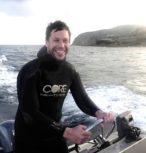DNA reveals the past and future of coral reefs
New DNA techniques are being used to understand how coral reacted to the end of the last ice age in order to better predict how they will cope with current changes to the climate. James Cook Univer

From 2005 to 2022, the main node of the ARC Centre of Excellence for Coral Reef Studies was headquartered at James Cook University in Townsville, Queensland (Australia)








This presentation will provide an updated prognosis of the overgrazing collapse of kelp beds driven by the range-extending sea urchin (Centrostephanus rodgersii) and outline antidotes currently being utilised by the Tasmanian Government. Since the first positive identification of an individual C. rodgersii on the mainland coast of eastern Tasmania in 1978, this population has irrupted to ~20 million individuals. Recent re-survey of 156 baseline sites established in 2001 revealed an increase in average urchin density from 1,495 to 2,623 urchins per hectare (a x1.75 increase) over the past 15 years. Meanwhile the coverage of barren grounds has increased from 3.4% to 15.2% (a x4.5 increase). Increase in urchin density, but a disproportionately larger increase in barrens, indicates an increasing frequency of local exceedance of the defined overgrazing tipping-point; with most overgrazing occurring on boulder-dominated reef between 18 to 30 m depth. Re-confirming baseline findings, commercial quantities of both abalone and rock lobster are absent from urchin barren grounds. Management of this significant and ongoing collapse of kelp beds must be proactive given the observed hysteresis of overgrazing. Importantly, the re-survey has enabled tactical intervention to be directed to kelp beds nearing collapse before it becomes too late. Conversely, for reef already collapsed to extensive barren grounds, a significant upscaling of several yet to be trialled mitigation efforts will be required if natural kelp bed cover, productivity and the broader reef ecosystem is to be regained.
Scott is a Senior Lecturer in Marine Biology, Ecology & Biodiversity Centre, Institute for Marine and Antarctic Studies at the University of Tasmania. Scott’s career is a rare in that he has been able to forge an academic career from his own backyard in Tasmania where he grew up as a keen angler and nature geek. Scott completed his undergraduate degree, honours degree, PhD and 4 post-doc appointments at the University of Tasmania before his recent appointment as an ongoing senior lecturer with IMAS. His marine biology experience includes nearly 3,000 research dives over 20 years, where he has chiefly focussed on conducting benthic surveys and experiments in temperate bioregions of southeast Australia, but with increasing coverage of reef systems across sub-tropical and tropical realms.
His chief research interest is the collapse and recovery of ecosystems and much of his work has focused on the effects of human impacts on reef ecosystems such as climate change, fishing, pollution and the introduction of invasive species. His approach to research and teaching in marine ecology is one founded on a strong understanding of natural history in combination with critical field experiments.
Scott has contributed more than 60 research articles and scientific reports. Notably his work within his Tasmanian backyard is highly cited globally, with his PhD papers alone being cited over 1,250 times. Scott has won a range of research grants and this week he is working with Andy Hoey who is a CI on the Discovery Project “Human impacts on marine herbivores that contribute to degradation of reef ecosystems” which also involves Graham Edgar and Emmett Duffy (at The Smithsonian).
New DNA techniques are being used to understand how coral reacted to the end of the last ice age in order to better predict how they will cope with current changes to the climate. James Cook Univer
A new study on the effects of climate change in five tropical countries has found fisheries are in more trouble than agriculture, and poor people are in the most danger. Distinguished Profess
James Cook University researchers have found brightly coloured fish are becoming increasingly rare as coral declines, with the phenomenon likely to get worse in the future. Christopher Hemingson, a
Researchers working with stakeholders in the Great Barrier Reef region have come up with ideas on how groups responsible for looking after the reef can operate more effectively when the next bleaching
Abstract: As marine species adapt to climate change, their heat tolerance will likely be under strong selection. Individual variation in heat tolerance and its heritability underpin the potential fo
Abstract: The Reef Ecology Lab in KAUST’s Red Sea Research Center explores many aspects of movement ecology of marine organisms, ranging from adult migrations to intergenerational larval dispersal
Abstract: Macroalgal meadows are a prominent, yet often maligned component of the tropical seascape. Our work at Ningaloo reef in WA demonstrate that canopy forming macroalgae provide habitat for ad
Abstract: Sharks are generally perceived as strong and fearsome animals. With fossils dating back at least 420 million years, sharks are not only majestic top predators but they also outlived dinosa
Abstract: Connectivity plays a vital role in many ecosystems through its effects on fundamental ecological and evolutionary processes. Its consequences for populations and metapopulations have been
Abstract: Evolution of many eukaryotic organisms is affected by interactions with microbes. Microbial symbioses can ultimately reflect host’s diet, habitat range, and even body shape. However, how
Abstract: The past few years have seen unprecedented coral bleaching and mortality on the Great Barrier Reef (GBR) but the consequences of this on biodiversity are not yet known. This talk will expl